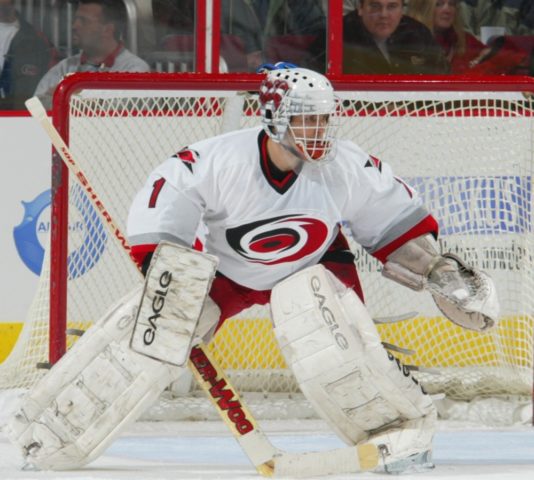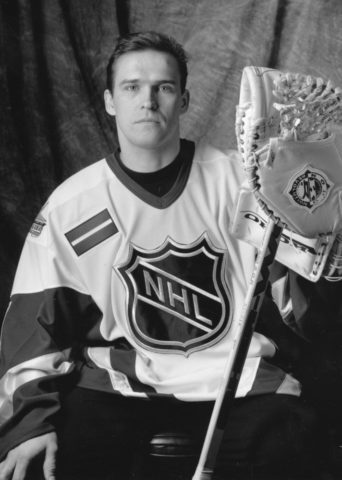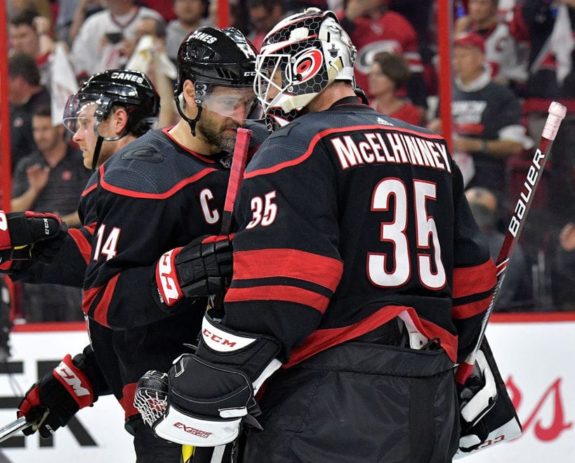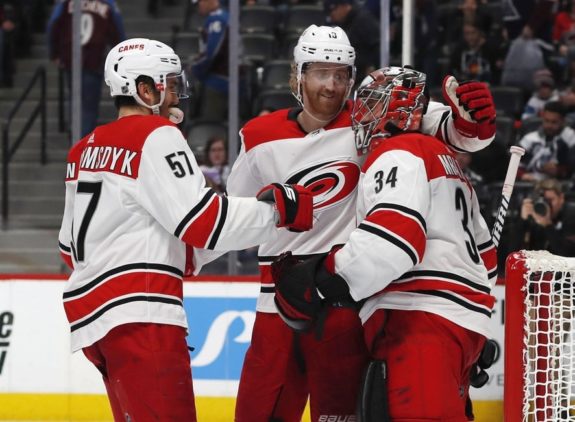Artūrs Irbe was loved by fans of the Carolina Hurricanes. Moving what were the Hartford Whalers to North Carolina by then owner, Peter Karmanos, was at the very least a gamble. Hockey in North Carolina was not guaranteed to be successful, especially trying to get established in the proximity of Tobacco Road, the mecca of college basketball. Would a professional sports played on ice succeed in a place where it barely snowed in the winter?
Hurricanes Form in NC
The first year in North Carolina saw games played in Greensboro, with a crew of goaltenders. Five different goaltenders saw playing time, with Trevor Kidd and Sean Burke carrying most of the load. The next season, 1998-99, Irbe became the starting goaltender. The NHL had re-structured the divisions, and the Hurricanes won the newly created Southeast Division. They qualified for the playoffs, losing two games to four to the Boston Bruins.

Irbe started 67 games that season and was cemented as the starter. His 2.22 goals against average and save percentage of .923 were respectable, and more importantly, the team had a goalie between the pipes that their fans could rally around. The expression, “Irbe says no!” whenever he made a particularly difficult save became a staple when listening to the games.
Irbe became a fan favorite, and making the playoffs so quickly after moving to North Carolina gave the Hurricanes credibility as a legitimate NHL team. Sure they had been the Whalers for years, but this team was now the Hurricanes, struggling to make it in the South. Irbe was one of a stable of players like Ron Francis and Keith Primeau, Glen Wesley and Jeff O’Neill who would help ensure that the Hurricanes would not only make it in North Carolina, but be successful, too.
Irbe the Man

Many may have forgotten the stranglehold that communism had on may Eastern European countries. Irbe was from Latvia, and was not allowed to leave the country and even consider playing in the NHL until 1991, when he was selected by the expansion San Jose Sharks in the Dispersal Draft. He had been originally drafted 196th by the Minnesota North Stars in 1989, but did not play for them as he remained in Latvia.
After a year in the minors, Irbe became the Sharks’ starting goalie in the 1993-94 season. He played 74 games, went 30-28-16, and led the Sharks to the playoffs. They eliminated the Detroit Red Wings and almost beat the Toronto Maple Leafs, but lost in seven games. Things were looking good for Irbe.
Then things changed for him in a bad way. Quoting from Legends of Hockey, “The summer of 1994 saw near tragedy visit Irbe. Back home in Riga he was doing sit-ups one day next to his sleeping dog. At one point he nudged the animal, which woke up and went berserk, tearing and ravaging Irbe’s hands and forcing him to go to the hospital. He suffered extensive damage to the tendons and nerves in his hands, and his career was threatened.”
Irbe was not extremely tall at five-foot-eight and was a reflex-centric goalie. His injuries slowed him down a bit and he ended up moving from the Sharks to the Dallas Stars and Vancouver Canucks. Things did not go extremely well in either venue, and he wound up in Carolina. He was able to return to form and not only lead the team to the playoffs in 1999, and 2001, but was a key part the team making it to the Stanley Cup Finals in 2002.
This relocated franchise was having early success that some teams would love to have had at any point. The Hurricanes eventually lost to the Red Wings, but the stage was set for hockey to thrive in North Carolina. Irbe was the starter for four of the six seasons he was with the ‘Canes, and is an undisputed part of the success the team has enjoyed. That success so early may have spoiled the fan base, which until last season had not seen the team in the playoffs since 2009.
Irbe’s tenure was on the decline, eventually giving way to Kevin Weekes. Irbe eventually cleared waivers with the Hurricanes and wound up a year later with the Columbus Blue Jackets, where his NHL career ended. Irbe did play with his home Latvia in the World Cup many times, and also on their team in the Olympics.
Related: Hockey Goalies – A Breed Apart
Weekes gave way to Martin Gerber and eventually a rookie who, much like Irbe, would put the team on his back and this time, win the Stanley Cup. Cam Ward was the Hurricanes goaltender ever since that run in 2006, and was replaced as the starter in 2017 by Scott Darling, but not really. Darling’s well-documented problems gave way to Petr Mrazek and Curtis McElhinney working together to backstop the Hurricanes’ playoff run to the Eastern Conference Final

Justin Williams has a quiet word with Curtis McElhinney of the Carolina Hurricanes. (Photo by Grant Halverson/Getty Images) 
Carolina Hurricanes Trevor van Riemsdyk, Dougie Hamilton and Petr Mrazek (AP Photo/David Zalubowski)
The fans of the Hurricanes will point to O’Neill, Francis, Rod Brind’Amour, and a host of others as former greats that helped the team stabilize and mature in North Carolina. But, if they had not had the gritty, determined play of Irbe, their history would not be nearly as great as it has been. The small, determined Latvian made a hockey team in North Carolina great, and stabilized them with success in the early going.